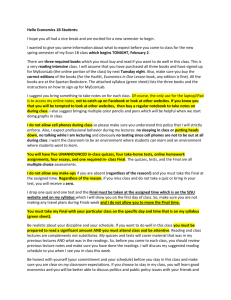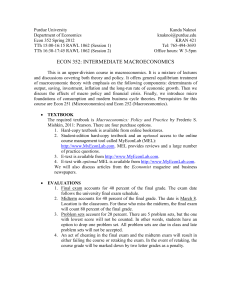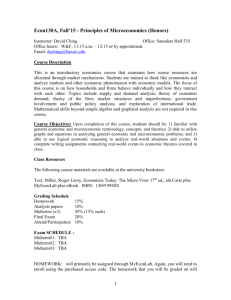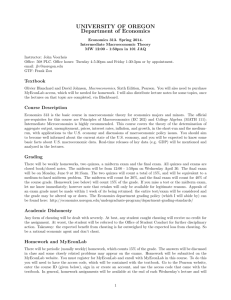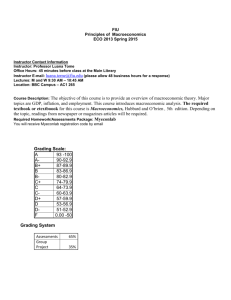Course Syllabus - Houston Community College
advertisement
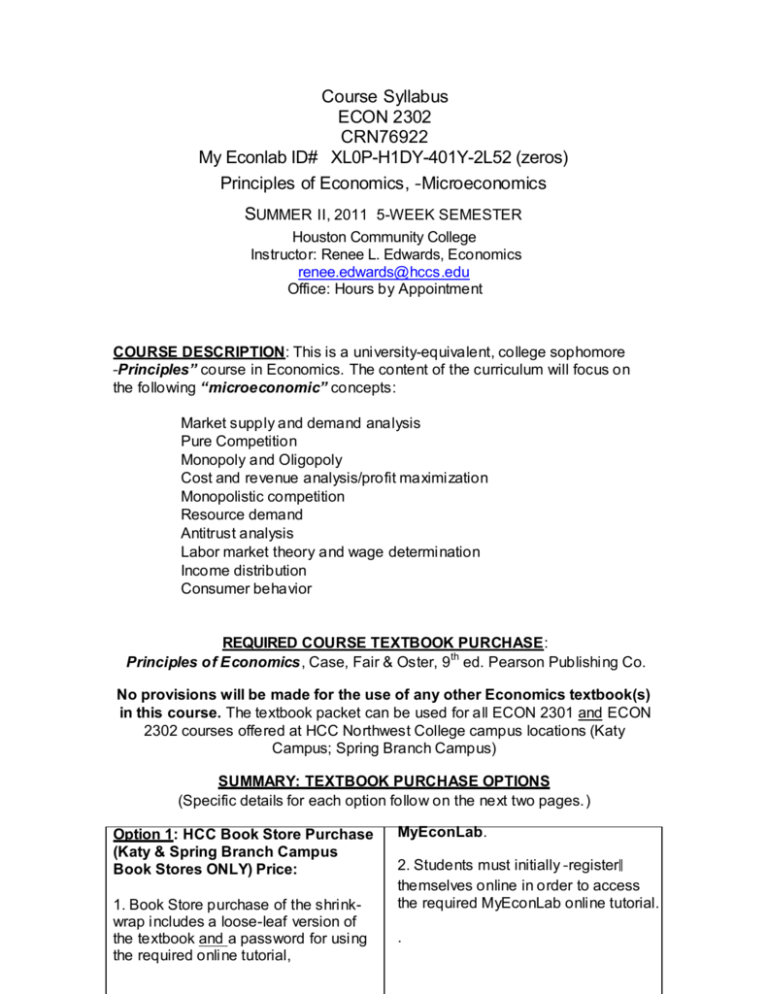
Course Syllabus ECON 2302 CRN76922 My Econlab ID# XL0P-H1DY-401Y-2L52 (zeros) Principles of Economics, ―Microeconomics SUMMER II, 2011 5-WEEK SEMESTER Houston Community College Instructor: Renee L. Edwards, Economics renee.edwards@hccs .edu Office: Hours by Appointment COURSE DESCRIPTION: This is a uni versity-equivalent, college sophomore ―Principles” course in Economics. The content of the curriculum will focus on the following “microeconomic” concepts: Market supply and demand analysis Pure Competition Monopoly and Oligopoly Cost and revenue analysis/profit maximi zation Monopolistic competition Resource demand Antitrust analysis Labor market theory and wage determi nation Income distribution Consumer behavior REQUIRED COURSE TEXTBOOK PURCHASE: Principles o f E conomics , Case, Fair & Oster, 9th ed. Pearson Publishi ng Co. No provisions will be made for the use of any other Economics textbook(s) in this course. The textbook packet can be used for all ECON 2301 and ECON 2302 courses offered at HCC Northwest College campus locations (Katy Campus; Spring Branch Campus) SUMMARY: TEXTBOOK PURCHASE OPTIONS (Specific details for each option follow on the next two pages. ) Option 1: HCC Book Store Purchase (Katy & Spring Branch Campus Book Stores ONLY) Price: 1. Book Store purchase of the shri nkwrap i ncludes a loose-leaf version of the textbook and a password for usi ng the required onli ne tutorial, MyEconLab. 2. Stude nts must initially ―register‖ themselves online in order to access the required MyEconLab onli ne tutorial. . Option 2: Online Credit Card Purchase of Text Materials (Details on next 2 pages) 1. Students would go to a publishing company webpage to purchase a pass code for usi ng the required onli ne tutorial, MyEconLab. 2. Students must initially ―register‖ themselves online in order to access the required MyEconLab onli ne tutorial. 4. Once ―registered‖ students may choose to order a loose-leaf PRINT VERSION of the text delivered by U.S. Mail or FedE x or 5. Students may choose to purchase an electronic (―e version‖) of the textbook accessible through internet from any computer. NOTE WELL: ―International copies‖ of the text may not contain the same subject matter and chapter layout as the required textbook packet mentioned above. A ll instruction and course presentation will be consistent with the packet mentioned above. Textbook Purchase Options 1st Optio n (HCC KATY CAM PUS o r S PRING BANC H CAM PUS Book Sto re Purc hase – approx. $180) – P urchase includes a loose- leaf hard copy version of the text and the online access code for the MyEconLab tutorial. Note well: The HCCS bookstore will NOT buy back this text packet. DIREC TIONS : Along with your textbook, the shrink-wrap packet includes a cardboard insert which, when opened, contains your MyEconLab Access Code. With this access code AND your Course ID # in hand go to the following webpage: 1) http ://myeco nlab. mathxl.co m/lo gin_eco n. htm 2) Click on the Orange “S tudent” icon under the Register button; 3) Enter the MyEconLab case sensitive Course ID # XL0P-H1DY-401Y-2L52 your instructor has provided and click the “NEXT” button; 4) Go to the bottom of the page and, since you have your access code in hand, click on the Access Code radio button and click the N EXT button; 5) The next page is an acknowledgement that you will agree to the publisher’s use guidelines…click on “I Agree”; 6) On the next page you will be asked to enter the rather long access code (approximately 30 case sensitive characters) found on the cardboard insert in your shrink-wrap….click on the N EXT button after you have entered your access code. 7) You will be asked to provide your own US ERID and personal (secret) PASSWORD, both of which are needed to access the online tutorial. 8) Throughout the semester, you will go to the following website http ://myeco nlab. mathxl.co m/lo gin_eco n. htm and login using your userid and secret password. 9) Look for your course… it will be identified by its unique Course ID #. 10) After an initial login, click on the menu buttons on the left of your screen to identify the resources available to you in your course. 2nd Optio n ( O nli ne P u rc has e of M yEconLa b Acce s s Code and “ E” Ve rs ion of t he Te xt OR M yEcon La b Acce s s Code and “ P rin t Loos e -Le af Ve rsio n of the Te xt. Approximate Price: $85. First “registering” yourself into the MyEconLab website using your unique Course ID # then Purchasing a MyEconLab Access Code AND an “E Ve rsion” (electronic version NOT a hard copy) of the textbook OR – Buying a MyEconLab Access Code with a looseleaf version of the text (U.S. mail delivered) Whichever option above you choose, you will be given an opportunity to purchase a hard copy of the textbook (shipped via FedEx or U.S. Mail) identified as a “Print Option” Go to http ://myeco nlab. ma thxl.co m/lo gin_eco n. htm and follow each of the steps below: 1) Click on the Orange “S tudent” icon under the Register button; Enter the MyEconLab case sensitive Course ID # your instructor has provided and c lick the “NEXT” button; 2) Go to the bottom of the page and click on the “Buy Now” icon and click on the NEXT icon. 3) On the next page you must choose one of the options mentioned in the boxes above (E Version or Access Code ) Recall that in either case you may buy a hard copy of the textbook for an additional fee. 4) You will be asked to provide your own US ERID and a personal (secret) PASSWORD, both of which are needed to access the online tutorial. (P lease keep a written record of these in a secure place.) 5) Throughout the semester, you will go to the following website http ://myeco nlab. mathxl.co m/lo gin_eco n. htm and login using your userid and secret password. 6) After accessing your course homepage click the menu buttons on the left of your screen to identify and familiarize yourself with the resources available to you in your course. TESTING - ALL testing in this course will be administered ONLINE during dates/times listed i n the course syllabus calendar. Multip le-choice Questions (60% of the first two (2) tests) At various previously-scheduled times duri ng the semester students will login to the Blackboard learning platform and access multiple-choice test questions on the ―ASSESSMENTS‖ tab of the B lackboard Course Homepage. Dates and times as well as textbook chapters covered on each test are specifically identified at the end of this course syllabus in the SEMESTER CALENDAR. Blackboard will automatically grade your performance on each set of multiple-choice questions and post your score i n your Gradebook. You must download and i nstall a program called RESPONDUS onto your computer i n order to take the multiple -choice component of each test. This program will be made available to all students after the second week of the semester. You MUST follow specific instructions on Blackboard or else you risk invalidation of your test score. If you experience a ―technology glitch‖ of a ny sort or type (e.g. a ―crash‖ or a power shortage/surge this will be considered a ― MISSED TEST‖ – See the ―MISSED TEST‖ provision later in this syllabus. If you do not take the test duri ng the testing window this will be considered a ―MISSED TEST‖ – See the ―MISSED TEST‖ provision later i n this syllabus. If you do not fully complete all assigned textbook readings and MyeconLab activity, you will NOT do well on these test questions. Short-Answer Essay Questions (40% of the first two (2) tests) At various previously-scheduled times duri ng the semester, students will access Blackboard email to obtain short-answer essay questions. The responses to these ―open book‖/ ―open note‖ questions will be sent to your instructor i n the form of a private Blackboard email message. If you experience a ―technology glitch‖ of a ny sort or type (e.g. a ―crash‖ or a power shortage/surge this will be considered a ―MISSED TEST‖ – See the ―MISSED TEST‖ provision later in this syllabus. If you do not submit your responses/answers duri ng the testing window this will be considered a ―MISSED TEST‖ – See the ―MISSED TEST‖ provision later i n this syllabus. You MUST follow the provided ―submission guideli nes‖ associated with these short-answer essay questions in order to avoid penalty points. If you do not fully complete all assigned textbook readings and MyeconLab activity, you will NOT do well on these questions. REQUIRED ONLINE TUTORIAL HOMEWORK ASSIGNMENTS Purchase of your required textbook package includes a password providing you access to the textbook’s online tutorial, MyEconLab. A homework assignment has been created for each chapter covered during the semester. Each assignment has its own due date and these submission deadli nes are i ncluded in the course syllabus calendar. If you do not submit these assignments on or before the deadlines a score of ―0‖ will be assigned and these will be averaged in with all other assignments. MyEconLab Homework Modules wi ll be cumulatively worth 15% of your fi nal grade. Completion requires initial registration and ongoing semester access to the MyEconLab tutorial. Each Chapter Homework assignment is indi vidually scored. Each Homework assignment has a specific due date. Late submissions will be assigned grades of ―0‖ and these will be averaged i n as part of this component of your fi nal grade. Each onli ne Homework assignment contains multiple-choice questions. The cumulati ve average at the end of the semester is electronically recorded in the MyEconLab Gradebook. FINAL GRADE DETERMINATION: Test #1 will be worth 25% of your final grade and it will include si xty (60) points i n the form of multiple -choice questions and forty (40) points worth of short-answer essay questions. Test #2 will be worth 25% of your final grade and it will include si xty (60) points i n the form of multiple -choice questions and forty (40) points worth of short-answer essay questions. MyEconLab Homework Modules will be cumulatively worth 25% of your final grade. Completion requires initial registration and ongoing semester access to the MyEconlab tutorial. Each Chapter Homework assignment is indi vidually scored. Each Homework assignment has a specific due date. Late submissions will be assigned grades of ―0‖ and these will be averaged i n as part of this component of your fi nal grade. Each onli ne Homework assignment contains multiple-choice questions The cumulati ve average at the end of the semester is electronically recorded in the MyEconLab Gradebook. The Final Exam will be worth 25% of your final grade and it will be a one hundred percent multiple -choice question test. *The final exam is ―comprehensive‖ in nature i n that it will call on each student to recall and apply economic concepts covered over the course of the semester. However, the 100% multiple -choice question final exam will only include questions on the subject matter covered i n the last few weeks/last few chapters of the semester. See the course calendar for chapters covered on each test as well as those included on the final exam. Your numerical average will be applied to the following grade scale to determine ne a final assigned grade: Average above 90 - ―A ‖ Average 80 to 89 - ―B‖ Average 70 to 79 - ―C‖ Average 60 to 69 - ―D‖ Average below 60 - ―F‖ MISSED TESTS: If for any reason or circumstance you miss a test or any portion of a test at any point in the semester, your score on the comprehensive final exam will be substituted for the first missed test. If you miss a second test you will be assigned a final grade of ―F for the course. If you take both of the scheduled tests but you miss the fi nal exam you will be given the opportunity to take a closed book, i n-person, written long-answer essay question final exam at the HCCS Spring Branch Campus at a time and date to be determined by your professor. The final exam ―make up will be a written long-answer essay exam administered at a time, date, and location determined b y the instructor sometime before the electronic submission of final course grades. Students not able to take a make up for the missed final exam will receive a score of ―0 on the final exam. HCC COURSE WITHDRAWAL POLICY: Should you decide to simply stop attending class or otherwise doing online course activity without taking the time to withdraw yourself from the course, HCCS policy requires me to assign a final grade of ―F‖ at the end of the semester. STUDENTS WITH DISABILITIES As per the HCCS Distance Ed. Stu dent Handbook, which you are duty bound to access and thoroughly read, students seeking ADA-related accommo dations must follow the specific directions and process outlined in the Handbook. ACADEMIC DISHONESTY: The HCCS Distance Ed. Stu dent Handbook, which you are duty -bound to access and thoroughly read, defines a number of behaviors that constitute violation of the HCCS Academic Dishonesty policy. Disposition of all academic dishonesty incidents will be carried out in a manner as described in the S tudent Handbook. Students are responsible for familiari zing themselves with the specific provisions of the HCCS Academic Dishonesty Policy provisions including the following sanctions: 1) Dismissal and or suspension from HCCS; 2) A fi nal grade of ―F‖ in the course and 3) An appropriate notation on the student’s HCCS permanent record. I abhor cheating, lying, and other deceitful behavior whether it exists in the workplace or i n the academic or online classroom. I will enforce the HCCS Academic Dishonesty Policy and I will implement administrative safeguards meant to discourage violation of this policy. EXPECTED COURSE OUTCOMES Students who successfully complete this course will have reali zed the followi ng educational outcomes and objecti ves: A grasp of the role and operation of various domestic and i nternational economic sectors. The ability to think and rationali ze using an economic perspecti ve. Establishing a basic understanding of how capitalistic price systems and markets operate. An ability to understand how policy makers deal with unemployment, inflation, and economic growth problems. An understandi ng of how analyses are structured i n the context of economic rationali zation. The ability to understand and critique a number of schools of economic thought and how they have evolved as possible policy alternatives. A thorough understanding of i nteractions and relationships between and among economic systems in the world economy. EXEMPLARY EDUCATIONAL OBJECTIVES Successful completion of this Economics course will contribute ―value added‖ to the learni ng experience by teachi ng students how to: Employ the appropriate methods, technologies, and data that social and behavioral scientists use to investigate the human condition. Examine social i nstitutions and processes across a range of historical periods, social structures, and cultures. Use and critique alternative explanatory systems or theories. Develop and communicate alternati ve explanations or solutions for contemporary social issues. Analyze the effects of historical, social, political, economic, cultural, and global forces on the subject of study. Comprehend the origins and evolution of the U.S . and Texas political systems, with a focus on the growth of political institutions, the constitutions of the U.S. and Texas, federalism, civi l liberties, and human rights. Understand the evolution and current role of the U.S. i n the world economy. Differentiate and analyze historical evidence (documentary and statistical) and differi ng points of view. Recogni ze and apply reasonable criteria for the acceptability of historical evidence and social research. Analyze, critically assess, and develop creati ve solutions to public policy problems. Recogni ze and assume one’s responsibility as a citi zen in a democratic society by learning to think for oneself, by engaging i n public discourse, and by obtai ning information through the news media and other appropriate information sources about politics and public policy. Identify and understand differences and commonalties with diverse cultures. NECESSARY SKILLS You’ ll have to use and/or develop each of the following skills if you are to successfully complete this course: READING at the college level, meaning having the ability to analyze and interpret a variety of pri nted materials — books, articles, and documents. WRITING at the college level, enabli ng you to produce clear, correct, and coherent prose, adapted to purpose, occasion, and audience. This includes grammar, spelling, and punctuation, but the writi ng process itself. LIS TENING at the college level, i.e., being able to analyze and interpret various forms of spoken communication.(especially in organi zed study group activities with fellow students) CRITICAL THINK ING, embraci ng methods for applyi ng both qua litati ve and quantitative ski lls analytically and creati vely to the subject matter i n order to evaluate arguments, solve problems, and construct alternative strategies. COMPUTE R LITERAC Y, developi ng the ability to use computer-based technology in communicati ng, solving problems, and acquiri ng information. Students should also be able to evaluate the limits, problems, and possibilities associated with the use of present and future technologies. ECON 2302 COURSE SYLLABUS CALENDAR For each chapter referenced below students should: 1. Complete the corresponding Textbook Reading Assignment 2. Complete AND SUBMIT the corresponding MyEconLab Online Homework Assignment activity (25% of your final grade) 3. Access corresponding Powerpoint Presentations on the MyEconLab website. 4. Access the corresponding Chapter Learning Objectives on the MyEconLab website. 5. Access and complete the chapter Study Guide exercises and materials on the MyEconLab website. 6. Review any subject matter materials posted on MyLearningWeb page. DATES, TIMES, CHAPTERS, ETC. SUBJECT TO CHANGE Week Ending 16 Chapter 1 Chapter 2 Chapter 3 Chapter 4 Chapter 4 Week Ending 23 Chapter 5 Chapter 5 Chapter 6 Chapter 7 1st Exam Week Ending 30 Chapter 8 Chapter 9 Chapter 10 Chapter 11 Chapter 12 Week Ending 6 Chapter 13 Chapter 14 Chapter 15 Chapter 16 2nd Exam Week Ending 13 Chapter 18 Chapter 18 Review Review Final First Exam – Chapters 1-6 Second Exam – Chapters 7-12 Final –Chapters 13,14,15,16,18

